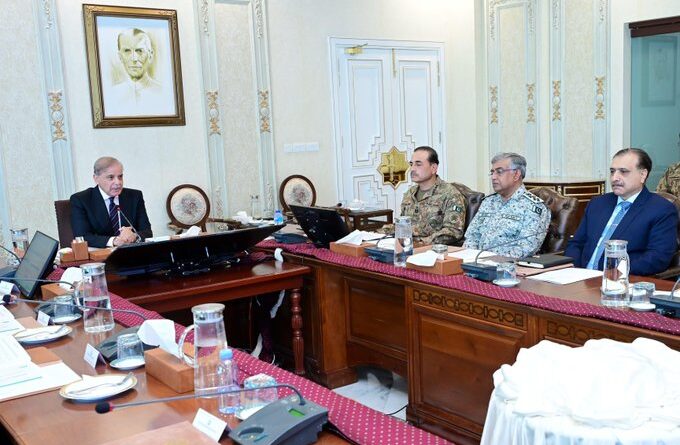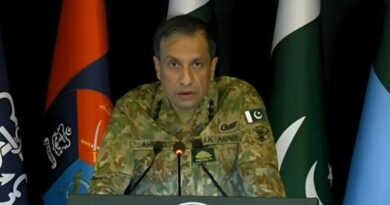National Security Committee reaffirms Tehran’s right to self-defence
Israel’s reckless actions threaten to ignite wider conflict, warns huddle
Digital payments should be made easier than cash: PM
Staff Report
ISLAMABAD: An emergency meeting of the National Security Committee (NSC) on Monday reaffirmed Iran’s right to self-defence following the airstrikes by the United States on three nuclear facilities.
A meeting of the Prime Minister Shehbaz Sharif chaired the NSC meeting, the highest forum for security deliberations comprising the civil and military top brass. Chief of Army Staff Field Marshal Asim Munir also attended the important moot, and reviewed the evolving regional situation following the Israeli aggression against Iran.
A press release from the Prime Minister’s Office said: “The committee strongly condemned Israel’s acts of aggression and expressed regret that these military attacks coincided with a constructive negotiation process between Iran and the US. These reckless actions have escalated tensions, threatening to ignite a wider conflict and diminishing the opportunities for dialogue and diplomacy. The NSC reaffirmed Iran’s right to self-defence as enshrined in the UN Charter.”
The committee members also conveyed their condolences to the Iranian government and people on the loss of innocent lives and offered prayers for the recovery of those injured.
“While reiterating Pakistan’s stated position, the NSC expressed grave concern over the potential for further escalation after the attacks on Iranian nuclear facilities in Fordow, Natanz and Isfahan on June 22 which violated the resolutions of the International Atomic Energy Agency, relevant international law and the UN Charter.”
The committee members also reaffirmed Pakistan’s close engagement with relevant parties in the situation and endorsed the government’s readiness to continue efforts and initiatives aimed at promoting regional peace and stability.
The NSC called on all relevant parties to resolve the conflict through dialogue and diplomacy in line with the UN Charter, underscoring the need to adhere to international human rights and humanitarian laws.
After months of attacking Gaza — flattening homes, targeting hospitals, and starving a besieged population — Israel expanded its assault by launching wide-scale air strikes against Iran’s nuclear facilities, military sites and private residences on June 13, killing top commanders, scientists and civilians. A day earlier, President Donald Trump said US air strikes “totally obliterated” Iran’s main nuclear sites, as Washington joined Israel’s war with Tehran in a flashpoint moment for the Middle East.
The strikes on Iran’s nuclear facilities, which came four days after Chief of Army Staff Field Marshal Syed Asim Munir’s meeting with Trump and a day after the government said it decided to formally recommend Trump for the 2026 Nobel Peace Prize for his role during the recent conflict with India, were condemned by Pakistan.
The US president had stepped up his rhetoric against Iran since Israel first struck the country, repeating his insistence that it could never have a nuclear weapon. Tehran has consistently denied the claim, saying its uranium enrichment programme is for civilian purposes.
Condemning the US attacks as a violation of international law, Iran said it was “resolved to defend Iran’s territory, sovereignty, security and people by all force”. It also responded with a volley of missiles at Israel that wounded scores of people in Tel Aviv.
Digital payments should be made easier than cash: PM
Prime Minister Shehbaz Sharif directed on Monday to make digital transactions cheaper and easier than cash for the public to promote the cashless system.
While chairing a meeting regarding cashless economy, the PM said that cashless systems are being preferred in developed countries and successful economies around the world.
The PM directed to form the Digital Payments Innovation and Adoption Committee, Digital Public Infrastructure Committee, and Government Payments Committee in this regard, said the Prime Minister’s Office (PMO) in a press release on Monday.
These special sub-committees will present recommendations regarding providing facilities for payments between the public and businesspersons, awareness regarding digital systems, activating the Pakistan Digital Authority, creating a national digital master plan, and facilitating transactions between the government and the private sector.
Moreover, the premier said that modern technology should be utilized for the establishment of a digital system for transactions and payments.
Earlier, the PM had formed a high-level committee to accelerate the country’s transition towards a cashless economy and advance digital financial infrastructure.
The PM said digitisation was among the government’s top reform priorities, aimed at eliminating the informal economy and increasing transparency through digital payments and fund transfers.
“To promote a cashless economy, we are taking policy steps to encourage digital payments and money transfers,” he said. “The federal budget includes proposals aimed at supporting this shift.




